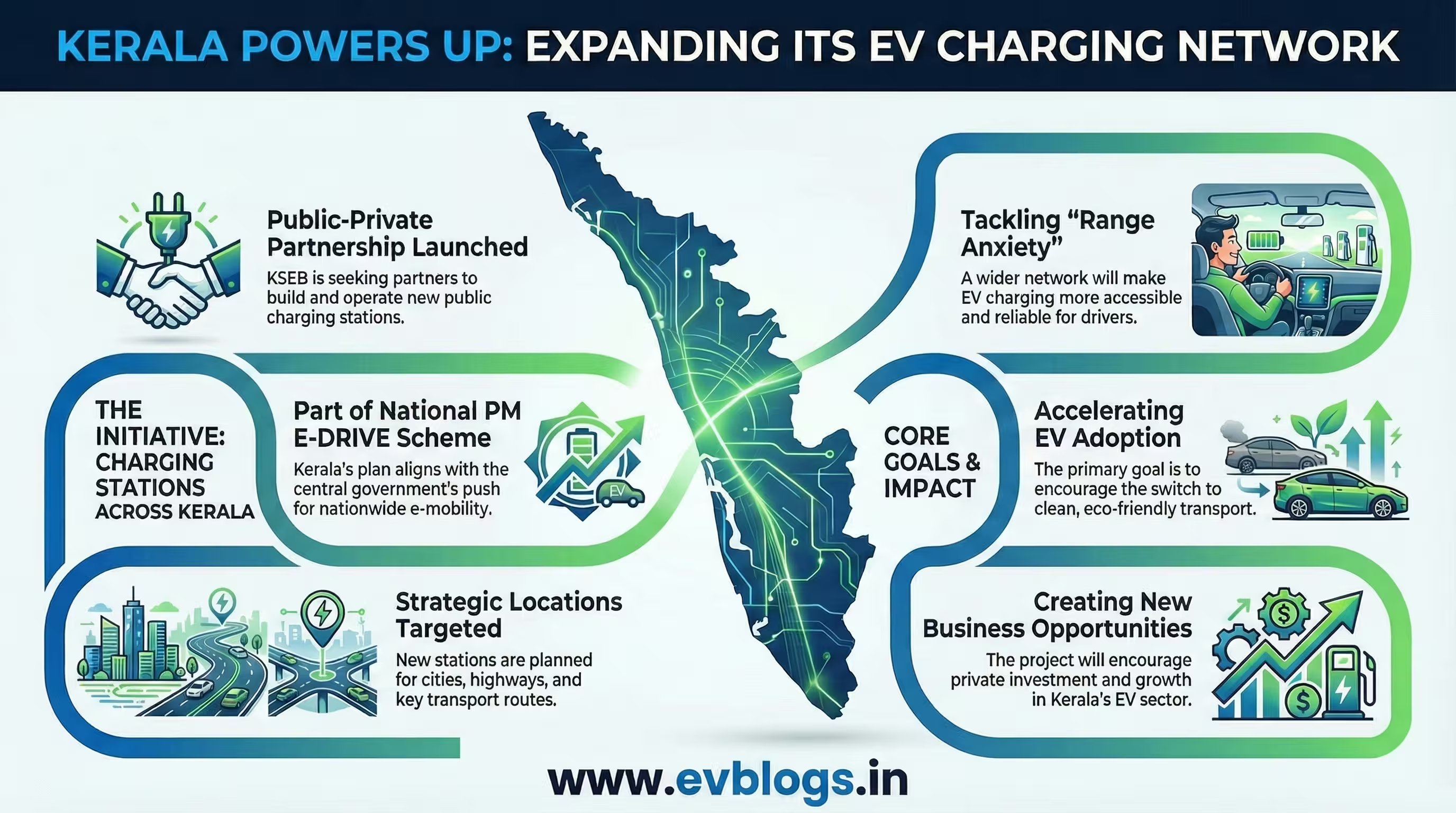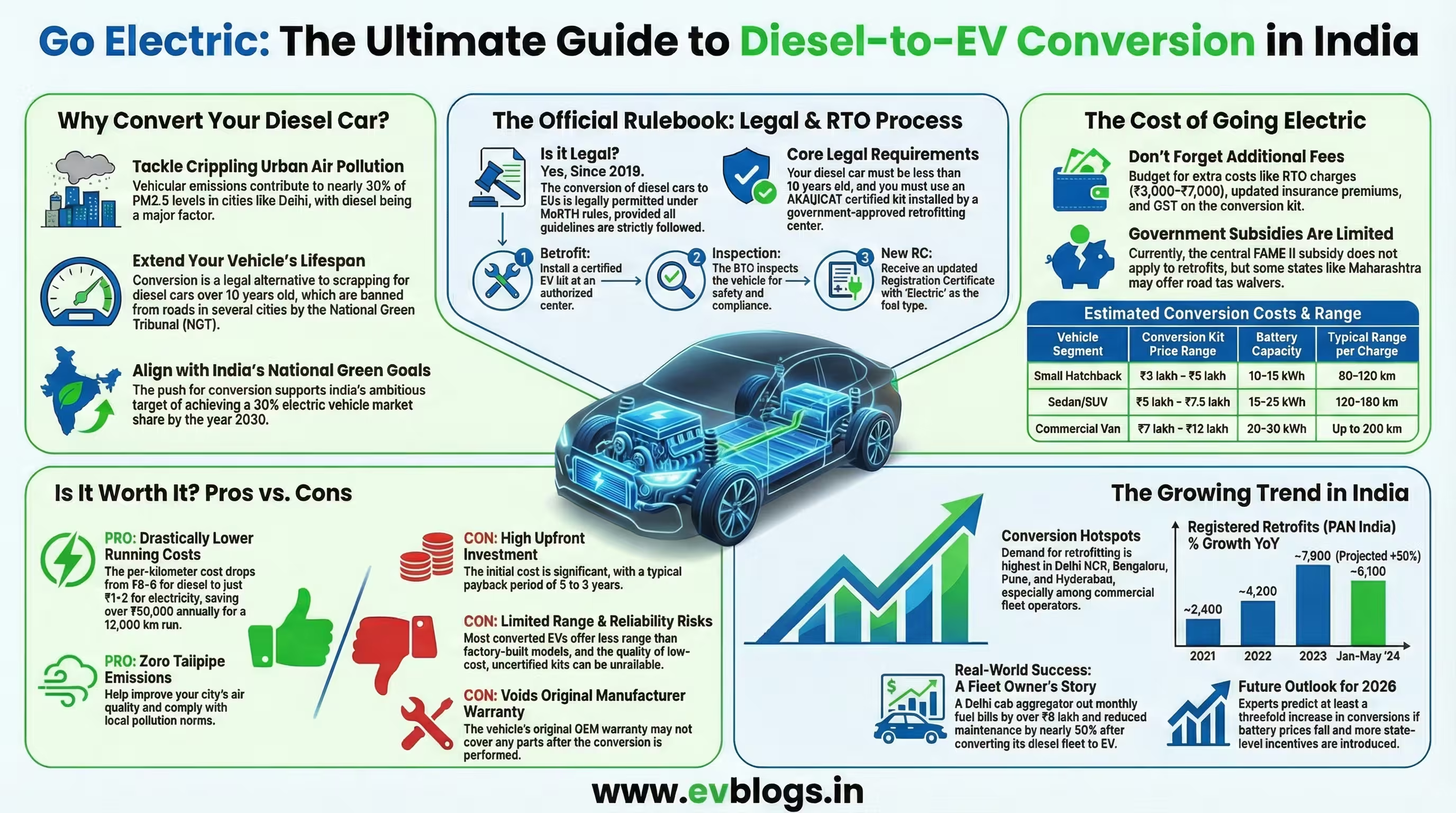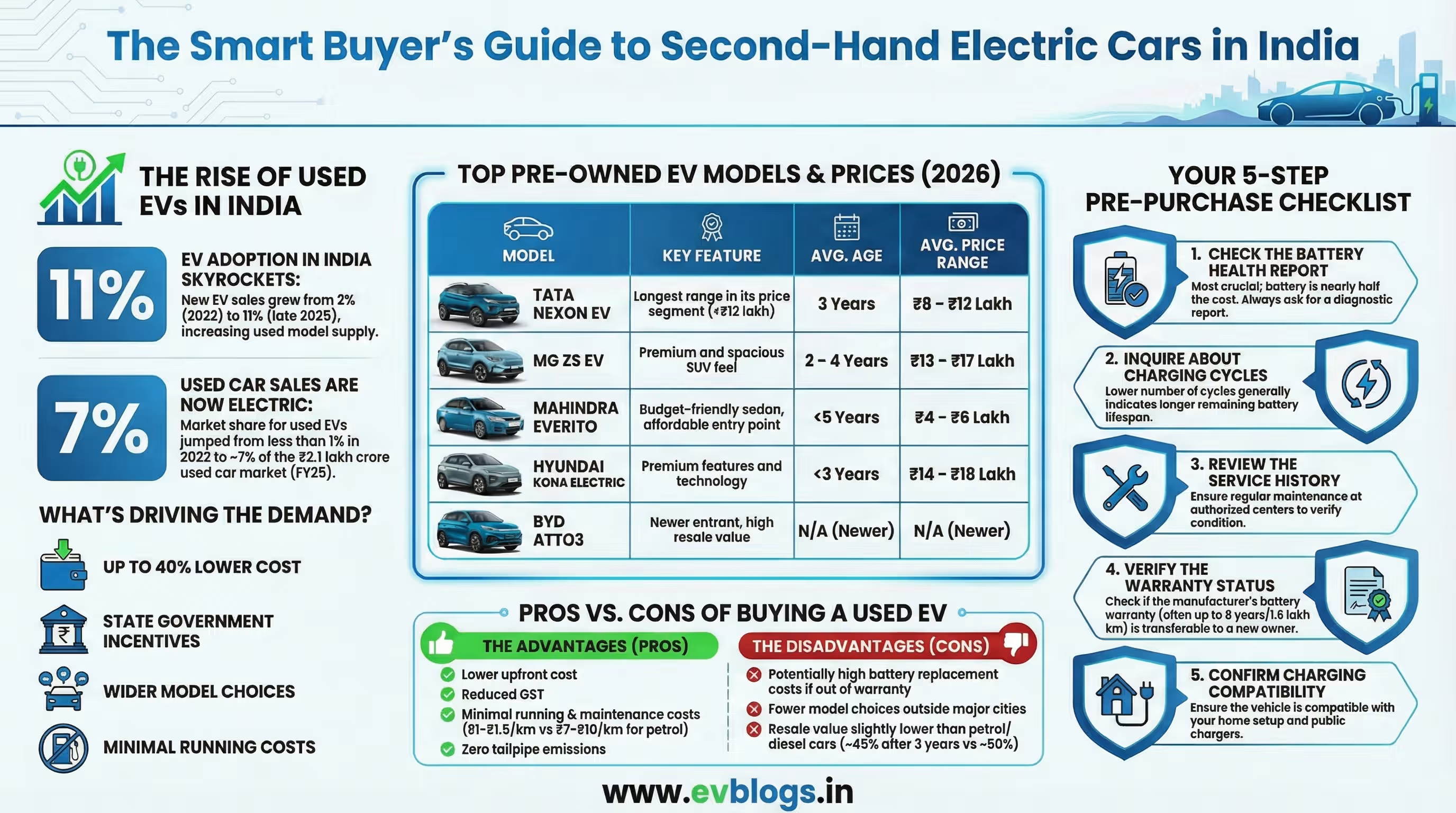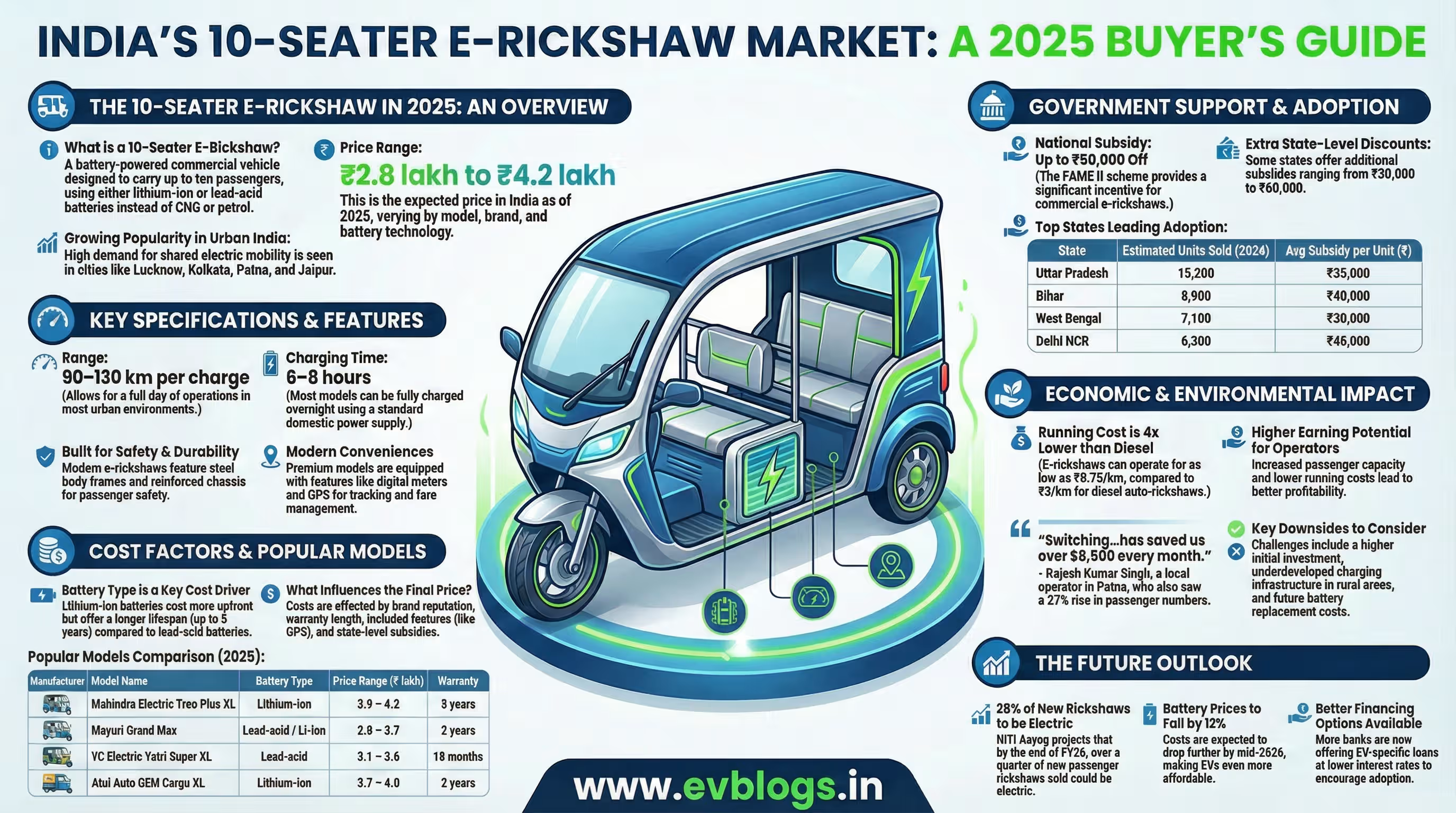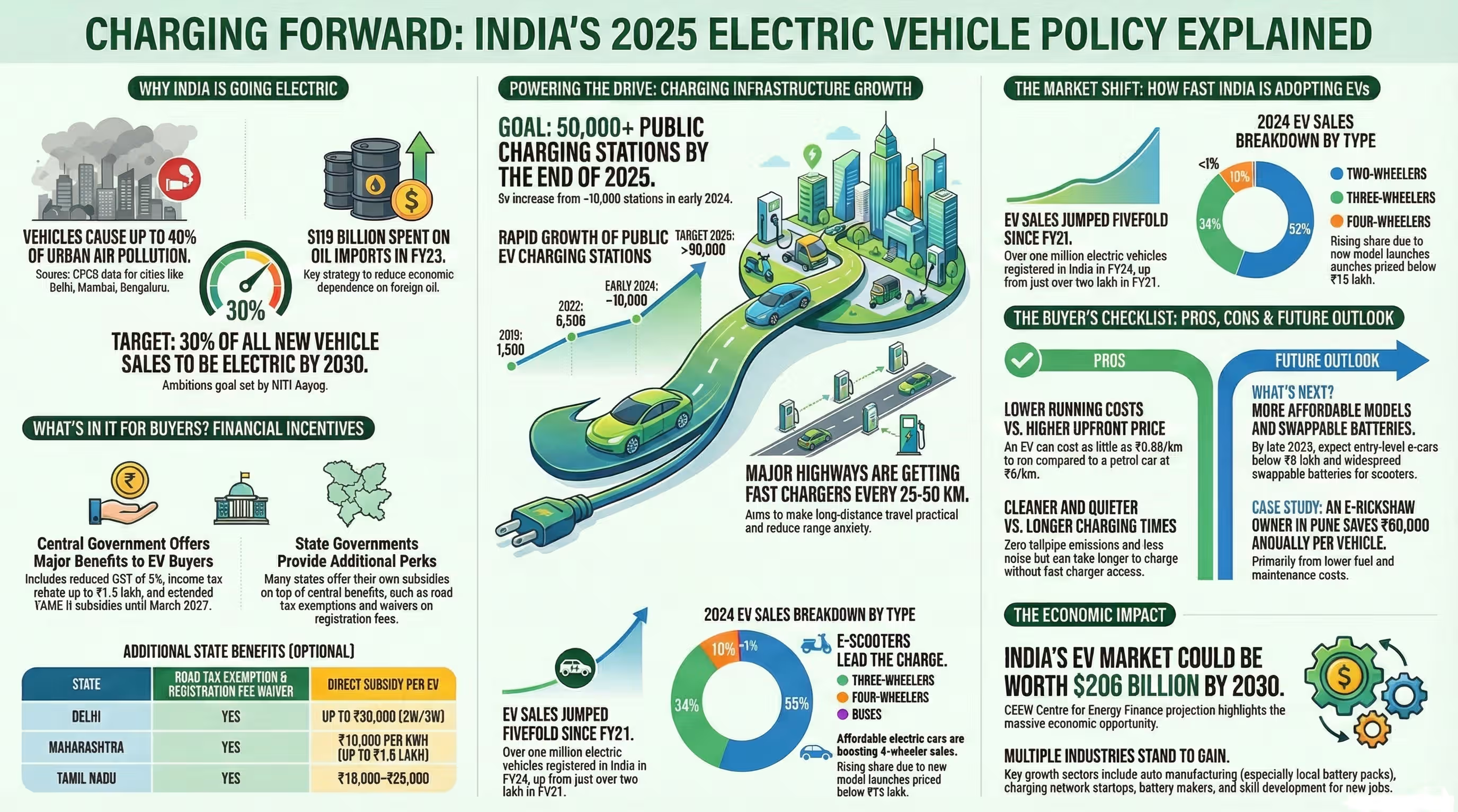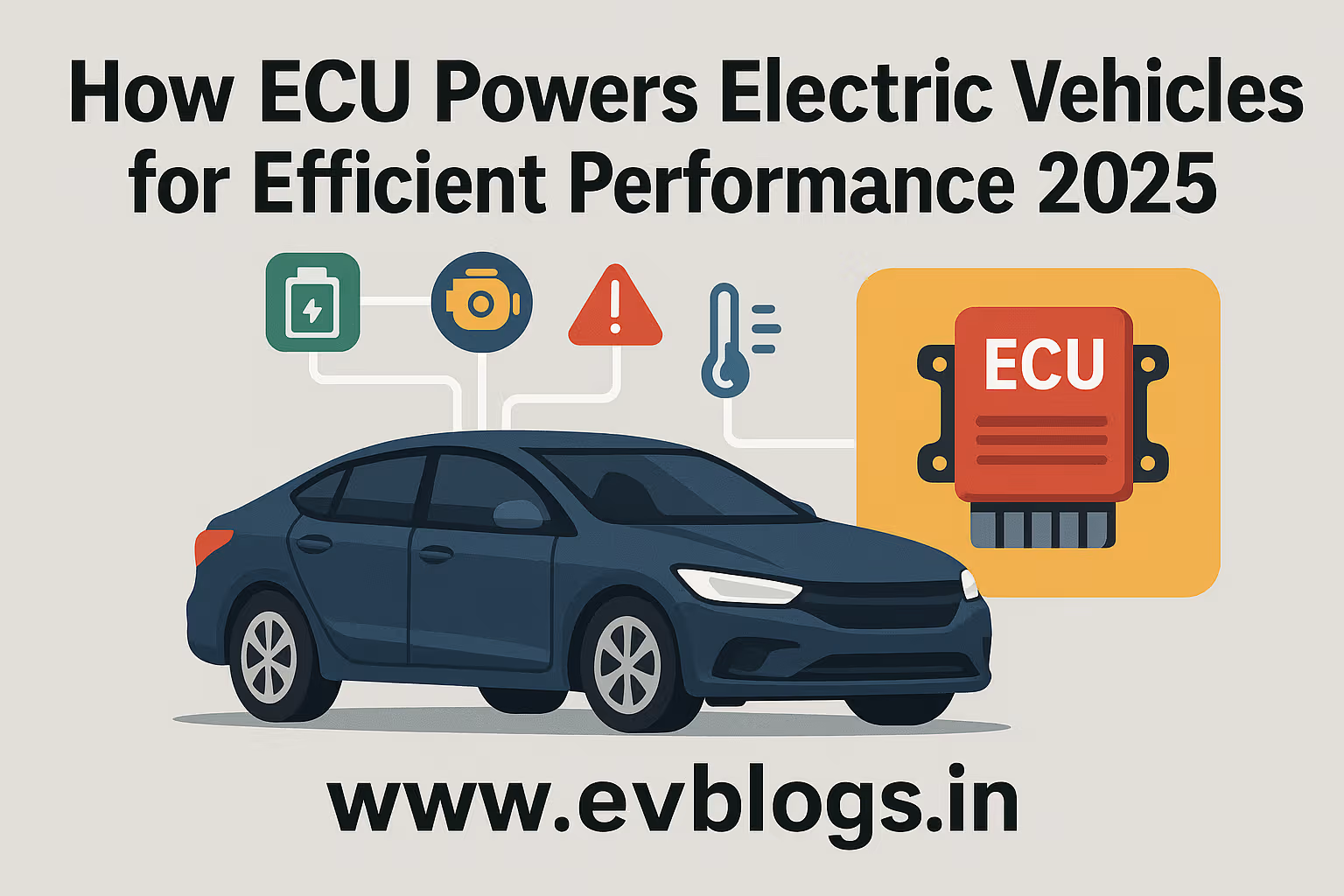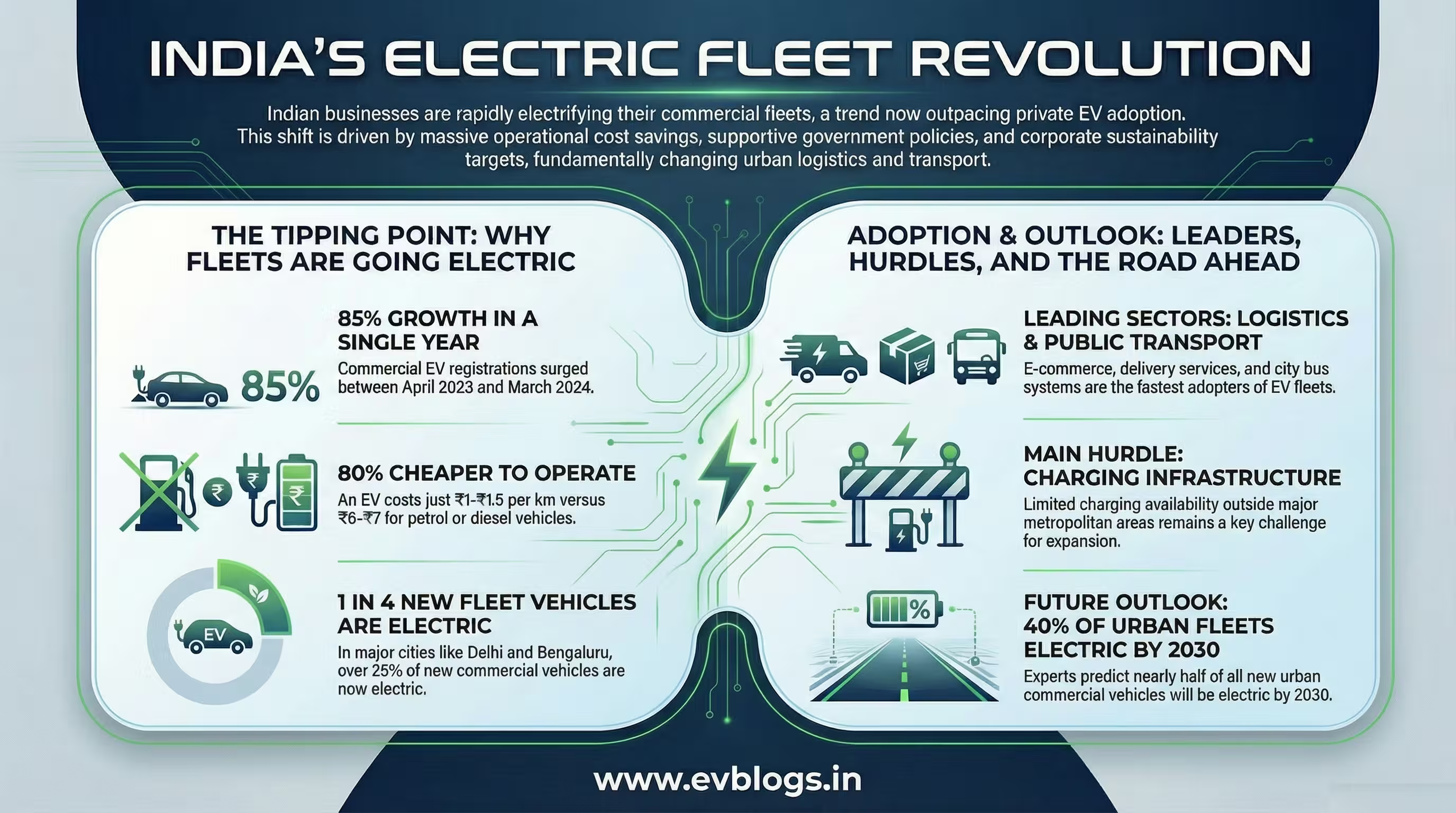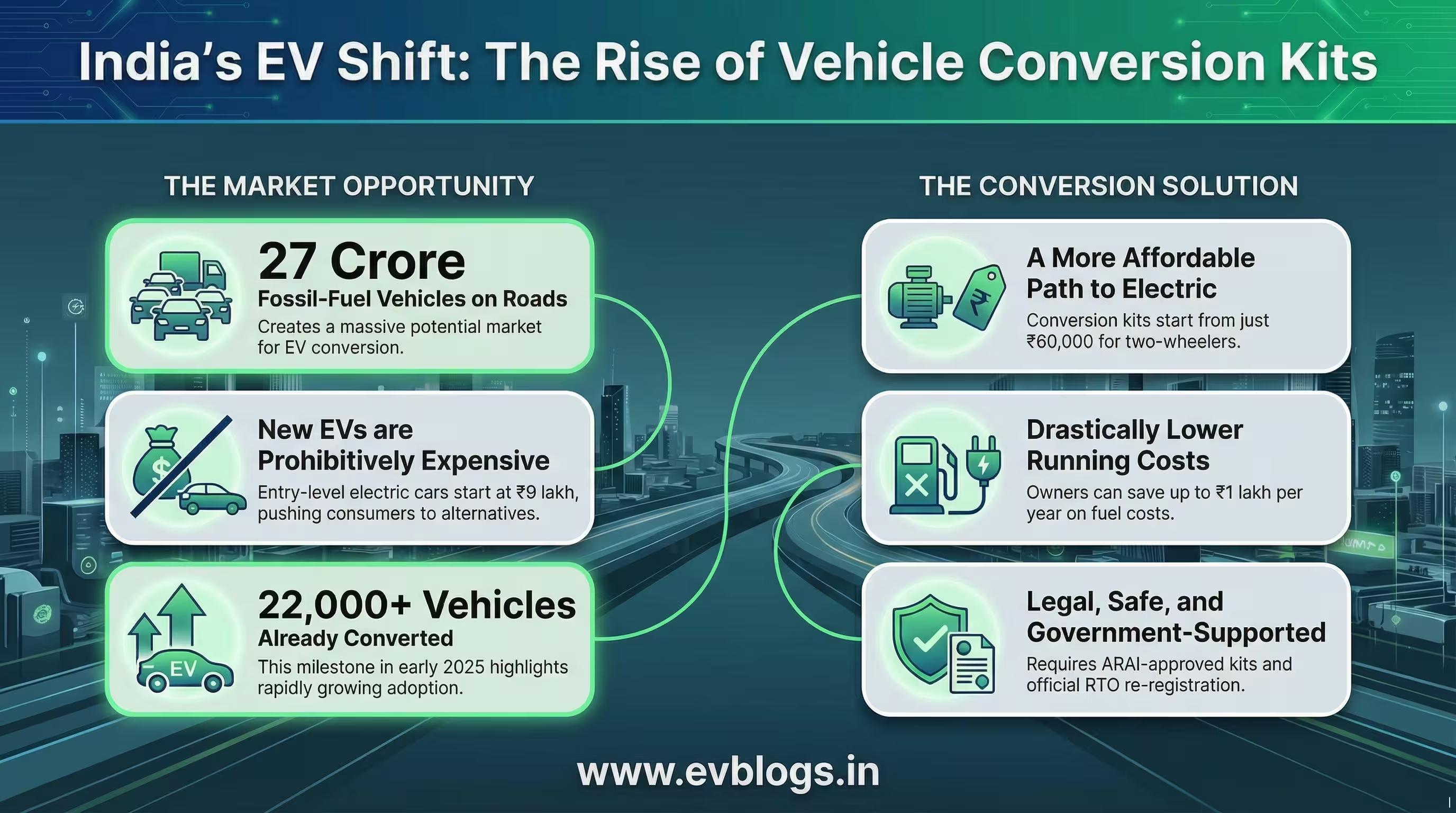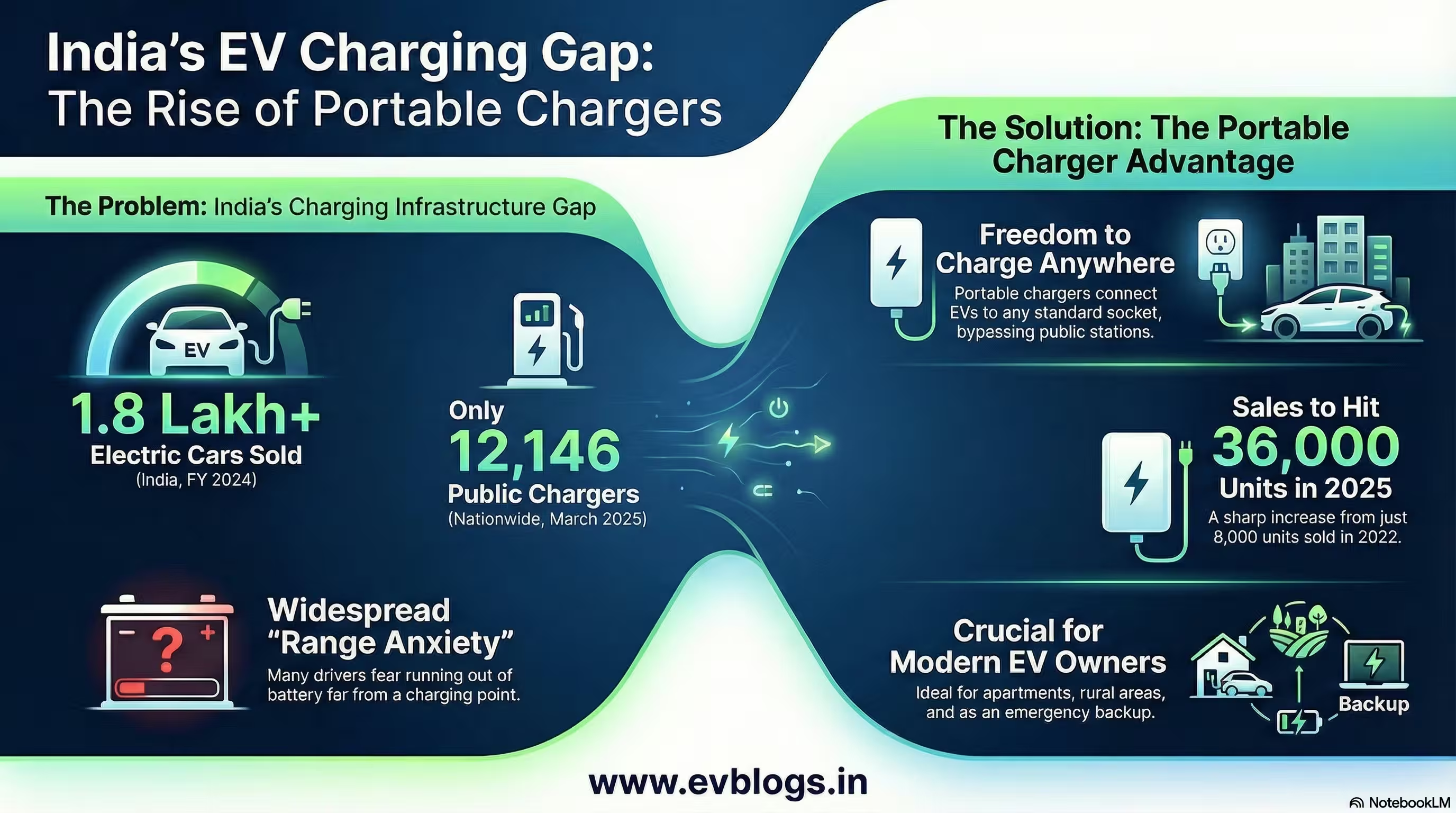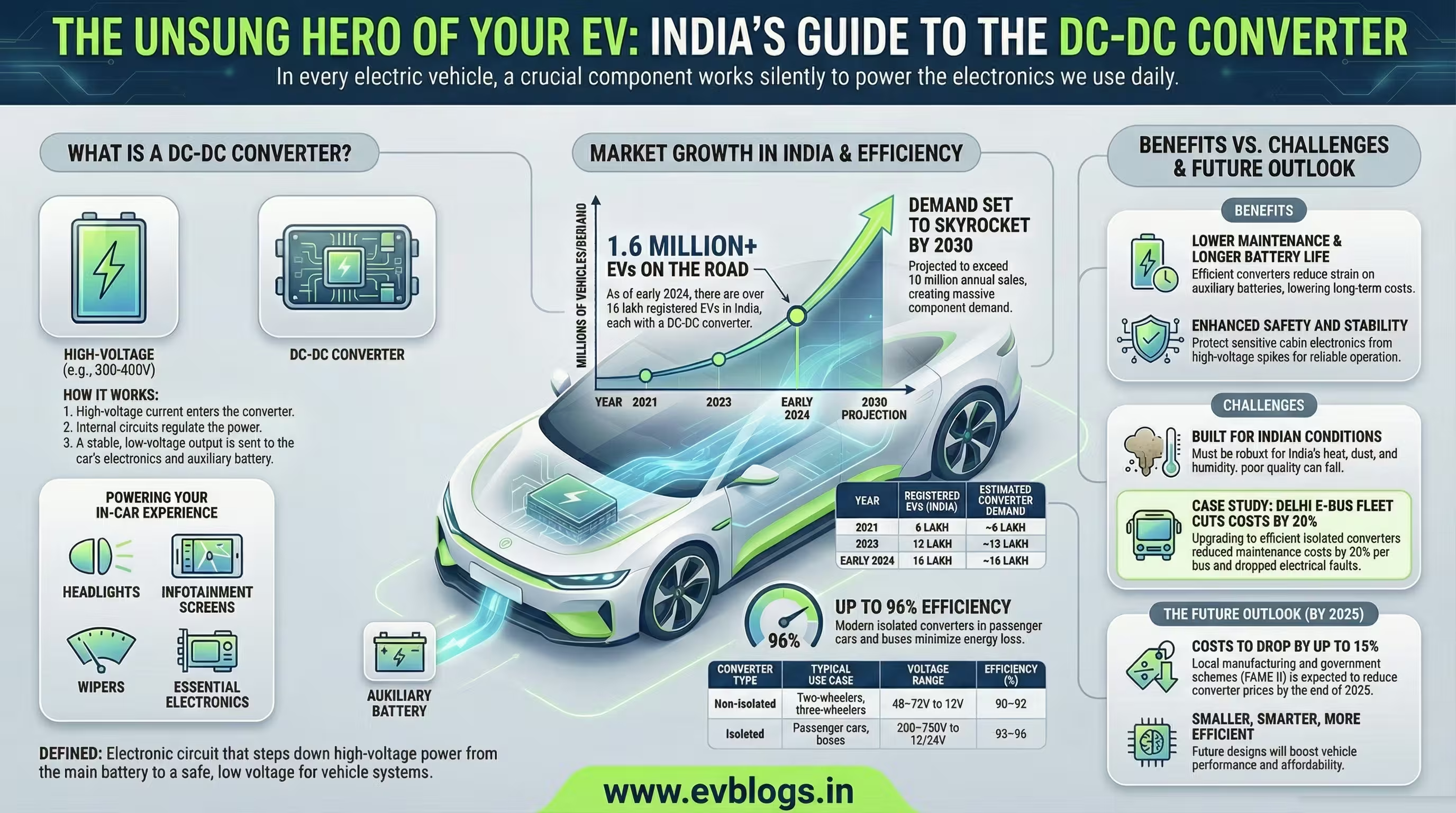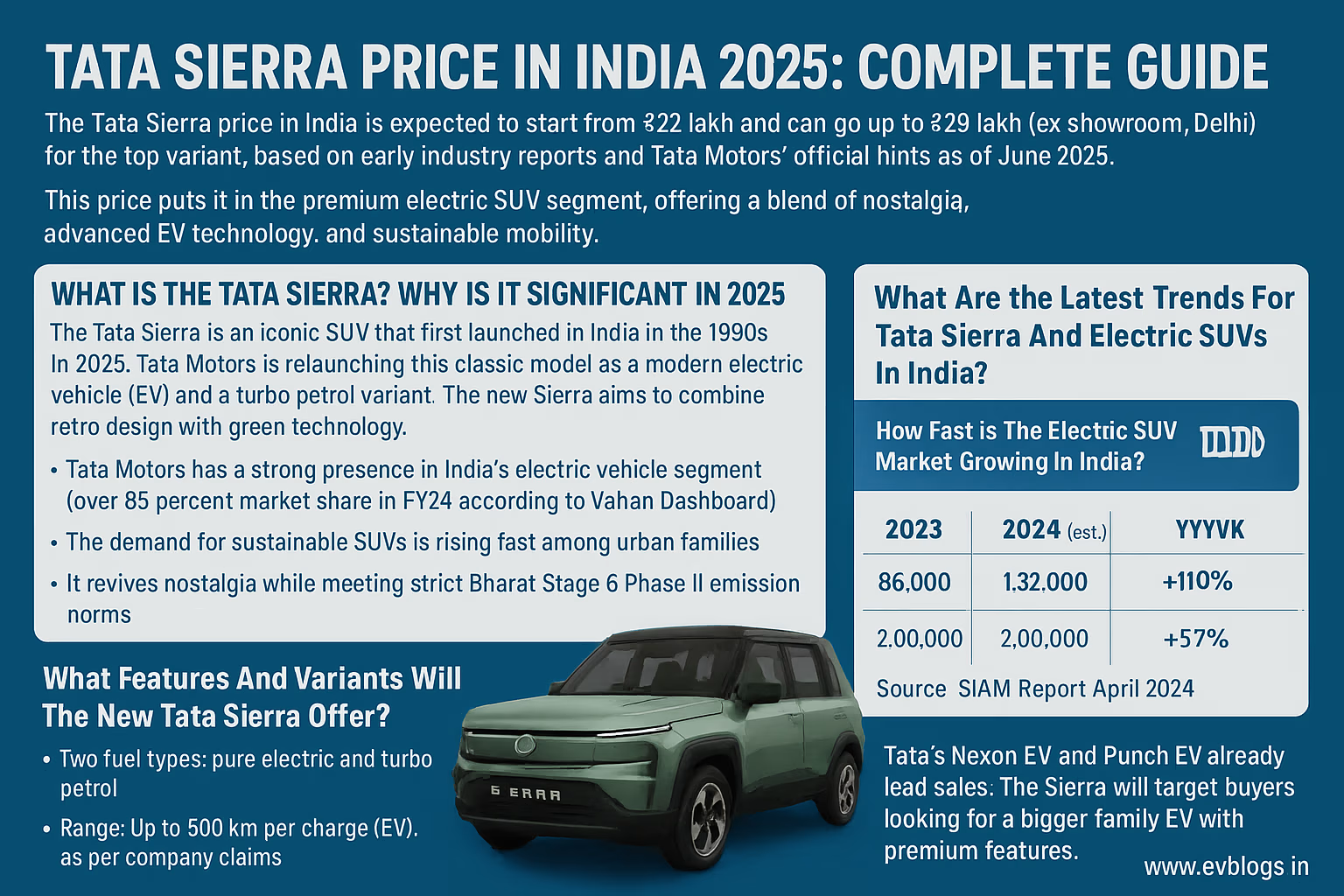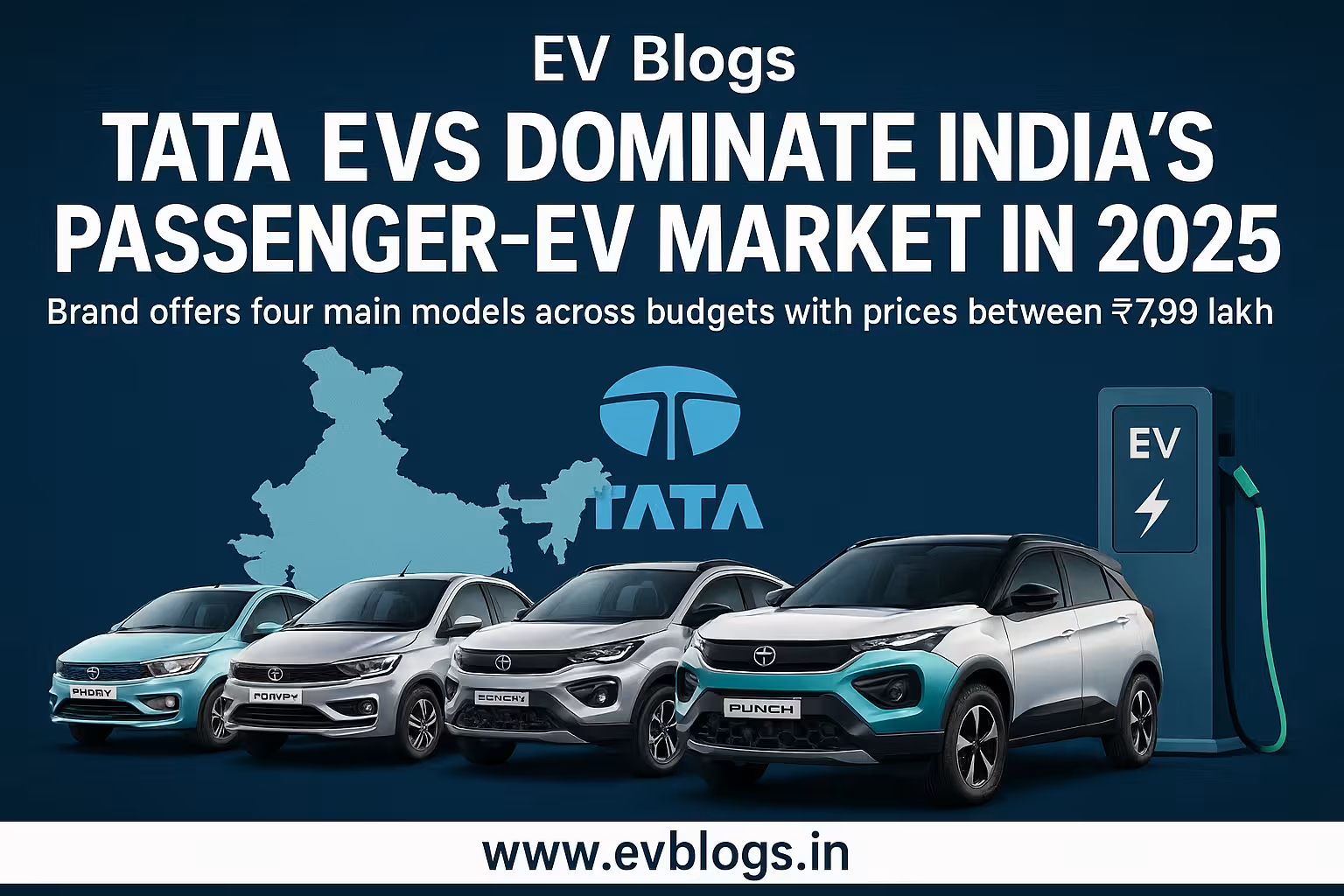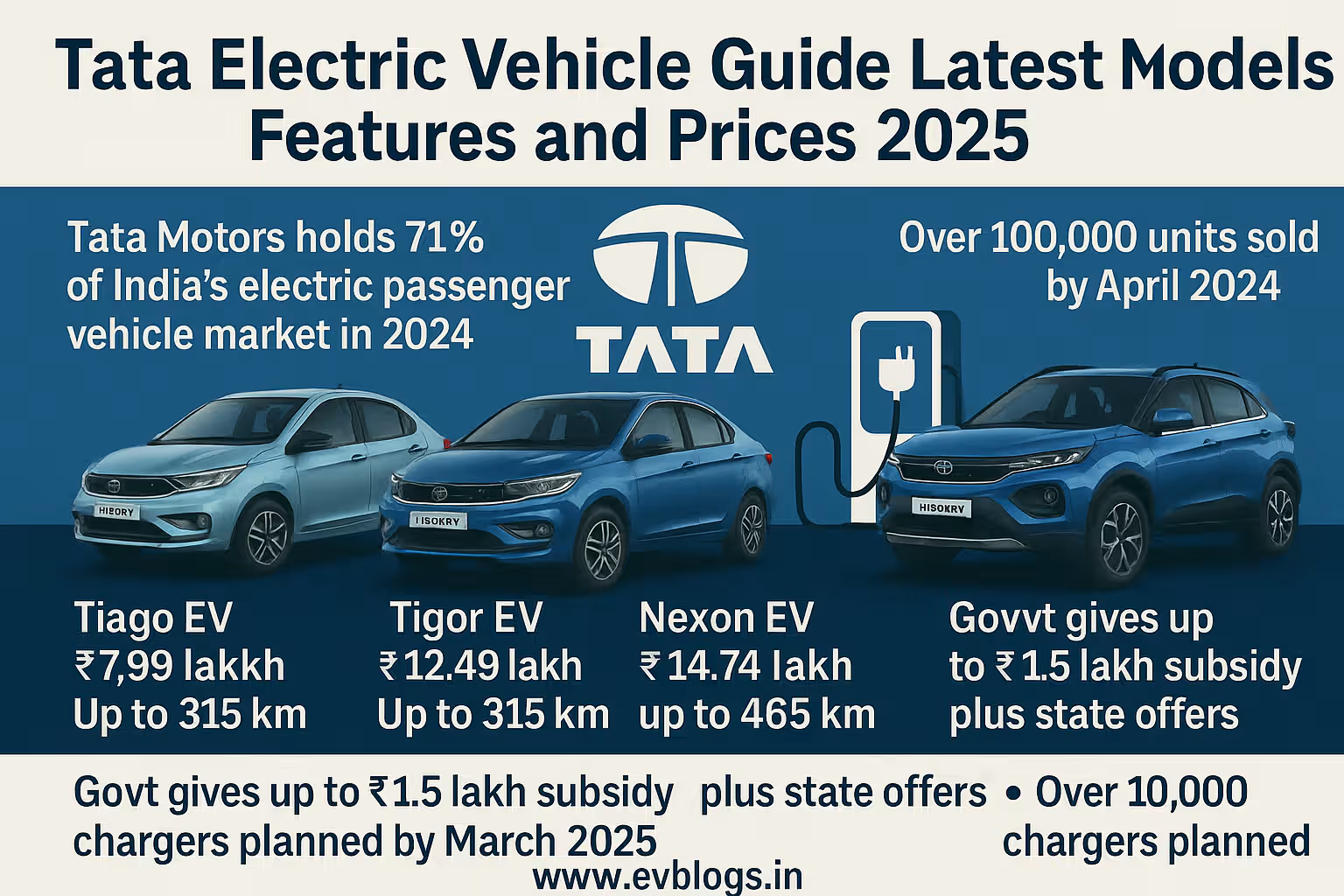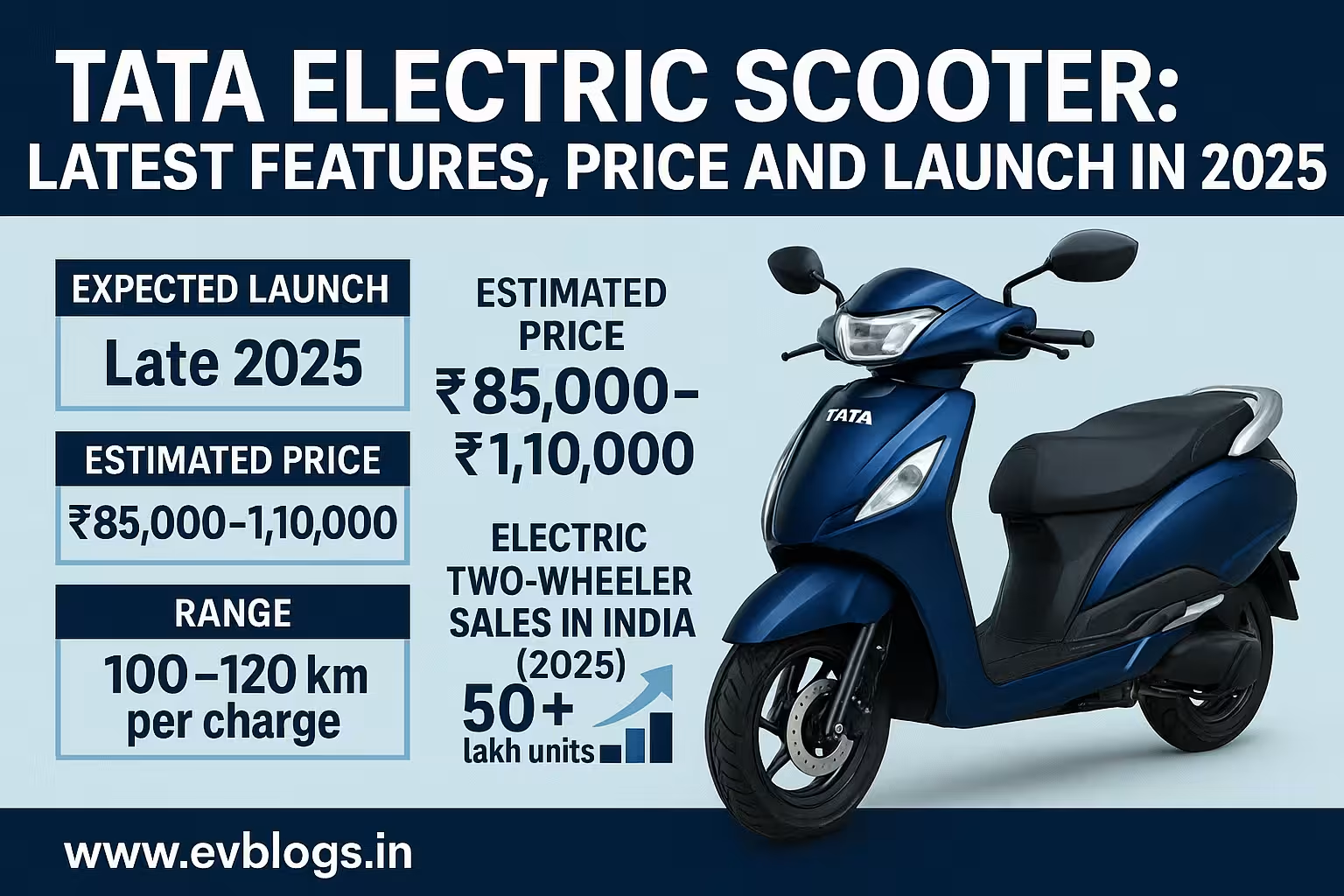Hedhvick Hirav
Hedhvick Hirav is a dedicated EV researcher and editor with over 4 years of experience in India’s growing electric vehicle ecosystem. Their contributions have been recognized in leading sustainability publications and automotive journals.
Summarize & analyze this article with
Choose an AI assistant and open this article directly:
Tip: if the AI doesn’t fetch the page automatically, paste the article URL manually.
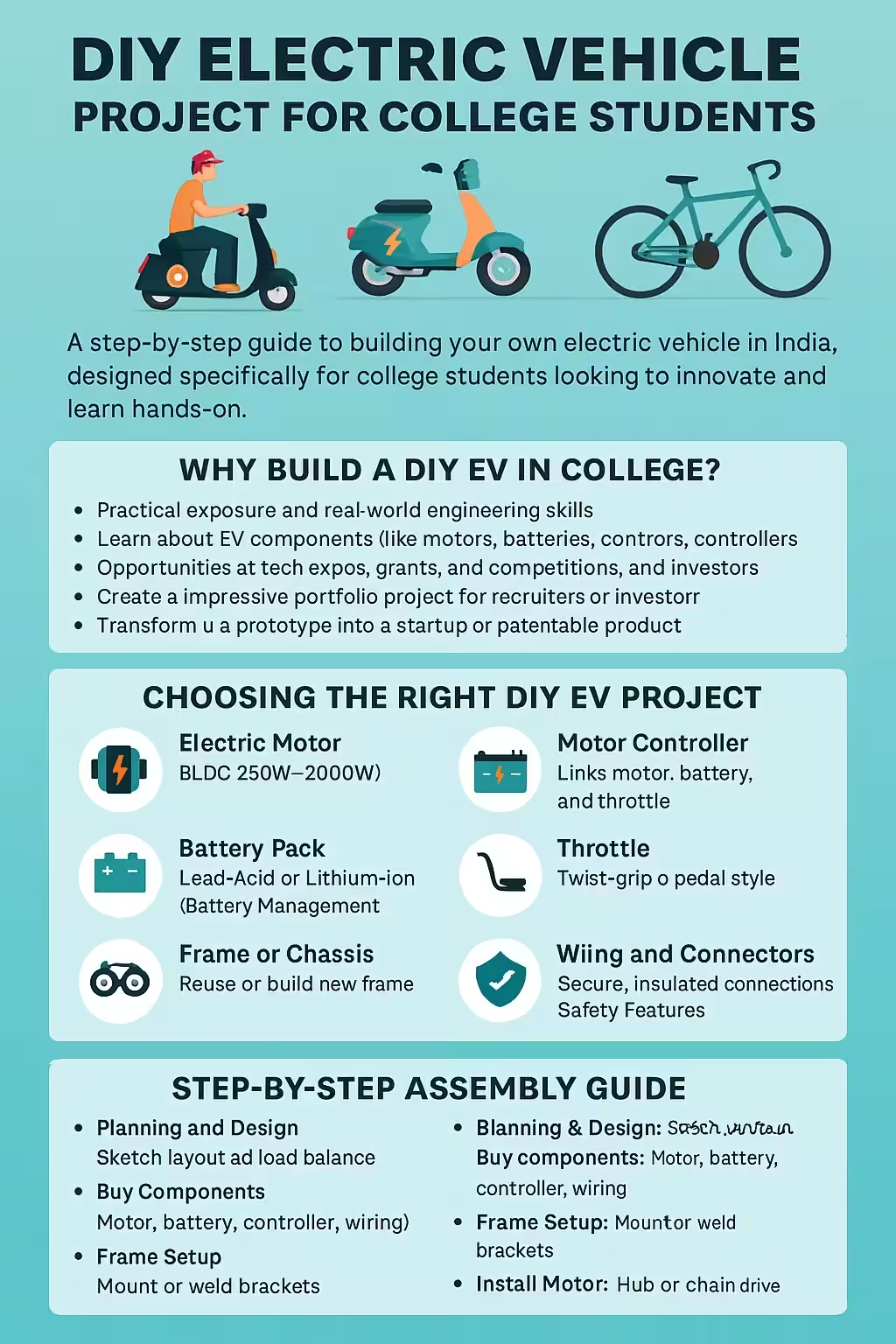
What is DIY Electric Vehicle Project and what would it matter after 2025 to college students in India?
Being a college student in India one would be able to have great emotional outpourings and success in making your own electric vehicle (EV). Government policy by 2025 is likely to favour e-mobility and there is a forecast that battery prices will fall substantially, so practical EV-related work is now no longer a vision of the future, but the requirement of students to join the rapidly developing car and green-tech industry.
DIY (DoItYourself) electric auto may be used with a battery powered auto (car or two wheel bike) or conversion of an existing petrol/diesel powered auto by either scratch building or conversion.
The very important skills that such projects ensure are in electrical engineering, electronics, mechanical design and awareness concerning the environment.
On the part of the Indian government in relation to the initiative of EV promotion in colleges and technical institutes, there are numerous initiatives, including the FAME India Scheme (Faster Adoption and Manufacturing of Hybrid and Electric Vehicle).
With the Indian government setting a target of 30 percent of electric vehicleization of the vehicle fleet by the year 2030, the companies would want to recruit students who are familiar with EVs.
The primary advantages of college students are the following ones:
- Become capable in the career-ready in e-mobility.
- Obtain access to additional internships, and employment possibilities in EV start-ups ( like Ola electric, Ather energy, Tata motors).
- Help India to have its sustainable, clean air ambitions.
This is a minor but little known factoid: By 2025, over 50 percent of India engineering colleges possess at least 1 e-mobility or electric vehicle (EV) lab and schools conduct competitions country-wide, including Formula Bharat and e-Yantra where students are allowed to create their own electric vehicles.
So, what should be the kind of projects to be undertaken with Indian College students in 2025 in terms of DIY Electric Vehicle?
As a prospective student in India you are starting out to build an EV, this means that you need to look out a project that fits you in respect to skill, economic ability and resources. The most common of them all in 2025 are as follows:
- Electric Bicycle/Scooter: This is an ideal beginners bike, no skills are required except basic electronics and mechanical.
- Electric Go-Kart: This type is common in college races: you learn about batteries management systems.
- Electric Car (Conversion): Here the level is high; it is conversion of petrol/diesel to an electric car.
- Solar-Powered EV: It has a renewable source of energy; best suited to eco-conscious students.
- Miniature Ev Prototypes: Scale model, small size, can be used to learn basic skills, and most importantly is cheap.
Main Considerations
- Cost: The range of electric bikes/scooters is 20,000-40,000 20; the conversion of an automobile may be 2 lakh and above.
- Duration: 3 to 12 months to be done at maximum college teams.
- Team: Multi discipline teams with electronics, mechanical, software yield the best.
Model 2025 USA, real Indian 2048 (as foreseeable)
- e-Yantra EV Challenge: EVs with electric self driving robots.
- Off roading electric cars: SAE India BAJA.
- Formula Bharat: Formula type of cars are run on electric fuel.
Building an EV of your own at home in 2025 step by step
1. Planning
- Make the choice concerning the type (bike, scooter, car etc.).
- Goals of the projects should be specific.
- Anticipate a plan of budget and a time frame.
2. Team Setup
- Delegation of roles, Purchase, Design, Mechanical electrics.
- Conduct research on existing designs of EV that are presented to the Indian market.
- Shortlist suppliers.
3. Sourcing Components
- Battery Lithium-ion or LFP or lead-acid.
- BLDC or induction or Motor hub.
- Projccion de controller: Matching motor/ battery Voltage.
- ComputerAided design (CAD.).
4. Electrical Systems
- Wiring, Brakes, Based on Throttle Battery Management system (BMS).
- AIS-038 is the standard that the safety is going to follow.
5. Assembly
- Fake /repair metal chassis.
- Ultimately fix battery and motor and controller.
- Completely ensure it is well wired.
6. Testing
- Preliminary low-loads works.
- Test (power/range/ speed).
- Charging tests.
India Estimated Future DIY of EV cost of Projects (2025)
| Auto Moter price Model ( RS ) | Moter Trigger | Battery PC | Motor Pow | Battery Charging period | Tour |
|---|---|---|---|---|---|
| Go -Kart ( EV ) | 60,000 1,20,000 | Chasis, motor and controller | 48V 30Ah | 1.2 2 KW | 4 6hr Race |
| Electric Bicycle | 20,000 -40,000 | Battery, motor, frame | 36V 10Ah | 250-500 W | 3-5 hr Entry level |
| Electric Scooter | 35,000 to 80,000 | Body, battery | 48V 30Ah | 450 To1000 w | 4 To 6 hr Less range |
| Solar EV Bike | 30,00070,000 | Solar panels, controller | 36V 10Ah | 250500 W | Solar-based Renewable energy |
| Miniature Prototype | 10,000 25,000 | Scaled parts, materials | 12V 7Ah | 100 200 W | 2 3 hr Learning/ demos |
| Car (Conversion) | 1,20,000 2,50,000 | Conversion kit and batteries and motor | 72V 100Ah + | 5 10 kW | 6 10 hrs RTO approval is required |
Indicators that demonstrate costs to be hitting:
- Nature/kind of battery.
- Imports - the duties on import.
- Discounts with suppliers to the students.
- Sponsorship opportunities.
Potential Cost of Self-Build (2025) Supplier companies in India of Self-Build EV Components
| Name of suppliers | Suburb of suppliers | What You produce/orientation | Maximum of prices(INR)/ Minimum or Maximum | Does your product contain battery? | Time delivery of warranty- specifically qualified |
|---|---|---|---|---|---|
| Lithium ion Pacific aviation Battrixx 100 | Mumbai | Batteries | varies | Yes | 1 yr battery life 1710-14 days Student price |
| EV West India | Chennai | Motors, controllers | 35k to 1.8 lakh | Optional | 6 mo W.1-2 weekCar projects |
| Robu in | Pune | Miniature EVs, e-bike kits | 6k40k | 3 mo | 35days Budget |
| Olectra Greentech | Hyderabad | Battery Olectra Greentech Hyderabad packs Hello | 8k-1.5 lakh? | Yes | 1 yr 1 week Battery power big |
| Bengaluru | High-efficiency motors | 12k-80k | Altigreen Labs | No | 1 yr 10 days Performance motors |
| Hykon India | Kerala | BMS and solar EV, Not fixed | yes,1yr, Not fixed | Solar integration | |
| E-Drive Solutions | Bengaluru | Full conversion kits | 30k&2.5 lakh | Optional | 1 yr 1&2 weeks Two- & four-wheelers |
| Conversion kit E-Trio Automobiles | Hyderabad- | Car Conversion | 1 lakh+ | Yes | 1 yr 3 weeks conversion kit Road-worthy kit |
| electrotherm india/gujarat/ | electric scooter parts | varying/yes/1 yr/varying/efficiency accrues | |||
| Okaya Power | New Delhi | Batteries, chargers | 6k to 70k | Y | 1 yr 3-5 days Battery upgrade |
good Indian Budget/funding (college EV) schemes (2025)
In India sugar mills:
- FAME India Phase-II: Component subsidies, R& D stimulation by technical institutes.
- Atal innovation mission: EV lab and EV projects funded by the finance.
- AICTE-Pragati Scheme: Support initiatives of females- elephants.
- Student EV startups India get IND Startup India.
- State EV Incentives: In some states, labs will be given grants, competitions with various states, such as Maharashtra, Tamil Nadu, Delhi.
Benefits:
- Large part subsidies can go to 30 percent.
- Possibility to get hackathons and meetings with developers.
- Opportunities to test in the real life on campus shuttles.
Application Process:
- Complete well-laid project proposal, which will be approved by faculties.
- Hire during the periods in Jan-Mar.
The ones obtained with DIY EV Projects
General:
- Mech Design: chassis,Foot poundage.
- Telemetry controlectim argues.
- Planning of Project Management- timings and budgeting.
- Energy efficient, battery recycling; Sustainability Consciousness.
Career Impact:
- Makes it more likely to secure internships in companies such as Ather Energy, Ola Electric, Tesla India.
- The prototypes of the projects are normally on display during campus recruitment events.
But they are not post-coming (2025) in-the-world success stories in India
- IIT Madras: locally sourced parts Formula-style electric car; 35 percent cost saving.
- The NIT Trichy, Driven by Solar power, Campus shuttle; won an award of 2 lakh rupees by Atal Innovation Mission.
- Pune and engineering college: 53000 /convert, 1 lac/ complete, 70-km range.
Lessons Learned:
- When you begin with some aims and time frames.
- The process of discovering the ways of finding a faculty or industry mentor.
- The opportunities to win the award will be listed.
| Challenge | Solution |
|---|---|
| Technical failure | Carry out a stage testing; Get a specialist |
| Component delays | Place an order in advance; be friendly with the vendors |
| Dissemination of overspectives | Stay in the range 10-15 percent back-up Budget |
| Allocation & statutory attention( 2025, in India) Theoretical barriers | Become an early adopter of off-road/campus prototypes |
| Dropouts of team member | Assign definite roles; keep the morale high |
The AIS-038 safety goodwill is to watch.
- Keep invoices of stores correspondence on purchase and certificates.
- Approved RTO will be road legal.
- Maintain purchase-certificates and invoices of correspondence.
- During assembly/testing make sure you use safety gear.
- The campus employs research policies of local insurance.
In 2025 will I be able to drive my homemade EV in Indian traffic?
Final Verdict: As a college student in India, in 2025, DIY EV project will be one of the most forward-thinking, future-proof ways to be sit out. It creates useful skills and turns career opportunities as well as its contribution to green mobility in India.
FAQs
Q1. What does a typical cycle of college DIY EV project take?
Ok, but after RTO certification and pass of safety standards.
Q2. Approximately 3-12 months (in respect of the complexity).
Formula Bharat, Atal Innovation Mission, FAME India, E-Yantra and SAE BAJA.
Q3. What are the best government grants to a College EV project in 2025?
Am I expected to know something on electronics?
Q4. No need in help.
Where I would like step- by-step tutorials? It is a program through which many learn online and mentoring in teams.
Q5. Before you begin your project, be certain through the formal sources.
YouTube, NPTEL, Formula Bharat and E-Yantra open-source project wikis.
Disclaimer: All information on prices, policies and suppliers is true given that the information is as accurate in the year 2025 but is subject to change. Make sure of official sources before starting on your project.


